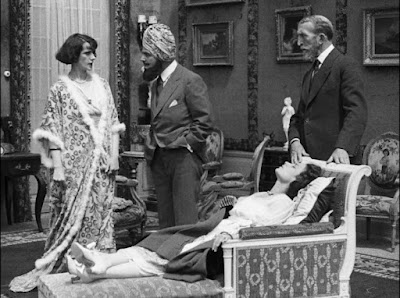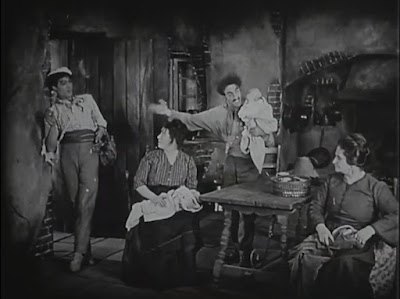All good things come to those who wait (mostly) and I’ve
often hoped to see Louis Feuillade’s magnificent fifth serial film (after Fantômas
in 1913-1914, Les Vampires in 1915-1916, Judex in 1916 and La
Nouvelle mission de Judex in 1917) in better quality than the fuzzy version
on YouTube which looks like it was copied from VHS by a camcorder 400 metres
across the road in fading light and with a failing battery… miracles so happen
and this new disc is A Thing of Utter Beauty!
This is a dazzling 4k transfer from the 2019 restoration by
L'immagine Ritrovata, of the 35mm nitrate negative from the Cinémathèque
française film archive, completed with a reversal duplicate held by Centre
National du Cinéma, and it looks absolutely like it was filmed yesterday. It’s
rare to see such detail and to feel the century melt away as you watch the
performers inhabit their roles and the familiar spaces of Nice, with such
clarity. The Palais de la Jetée and the beautiful Crystal casino may be long
gone but this is very much a travelogue for the jewel of the Riviera,
magnificent views, glorious mansions and the warm breeze of a Mediterranean mistral
running through the relentless, if gentile, pace of the storyline.
Scoring for six hours and 24 minutes is a challenge but Julien Boury has produced a tour du force of melodic invention which playfully drives alongside the narrative with strong major themes for story and character. Boury knows his film scoring and there are some gorgeous lines on harp and flute for our lovely heroine, and then a nod towards John Barry dynamics for the arrival of the British diplomat in episode five. It plays out at just the right pace – this is a marathon and not a sprint after all – and retains interest in its subject with sincerity, economy and an instinctive musicality. The score is played out with a chamber group consisting of piano, string and wind instruments with the odd found sound used sparingly and always to good effect. I wish I knew more but bravo Julien!
 |
| Mary Harald |
Tih Minh is, for me, an advance on Feuillade’s
previous epics with rich characters and tighter plotting that relies less on
improvisation than say Les Vampires. The cast of characters as
introduced, mostly, in Episode One: The Potion of Forgetfulness are well
realised and fleshed out more too, not just black and white baddies… well, black,
grey and white… with beards and definitive motives. Before that we have a
Prologue as explorer Jacques d'Athys (René Cresté) returns from the Orient with
a new fiancé from Laos, Tih Minh (Mary Harald) to be greeted by his mother (Madame
Lacroix), sister Jane (Lugane) and maid Rosette (Jeanne Rollette) who is
romancing his faithful, cheeky, manservant Placido (Georges Biscot).
Very little is known about Mary Harald who it seems was a
British subject born in Hong Kong and who only acted in French films as far as
the internet can tell. Possibly she was mixed race, it’s hard to tell, but that
could account for her only acting in France but… that’s pure speculation.
Whatever, she is very good indeed, telling many a story with restrained yet emotionally
fulsome expressiveness whether under the influence of enemy pharmaceuticals or
delighting in her new world and new family. She, as the title suggests, is the
star and the story is all about the post-war Empire and Britain’s enduring
challenge from Germany but also communism and just plain old bad guys with graduated
tints of evil.
 |
| The Doc, Dolorès and Kistna up to no good |
These baddies are… the mysteriously bearded “Asian” Kistna
(Louis Leubas), Doctor Gilson (Gaston Michel) and the La marquise Dolorès (Georgette
Faraboni) who has the real dash of stylish super-vixen, biting a rose with
menace in the introductory segment. What they’re about is disrupting the old
order… undermining the British Empire and controlling minds with chemical
concoctions. They also hold a cellarful of chemically controlled young women…
for what purpose we can only guess but there is some nudity revealed at this
point… and, whilst you’d never see that in a British or American film at this
point, it is a reminder that down the same avenue as entertainment is the
darkened rue latérale of exploitation.
Jacques d'Athys is soon called away on another expedition
and long months pass before the start of the first episode proper. The action
begins in Monte Carlo Casino where Lord Stone is breaking the bank with a sea
of great faces set by Feuillade as the backdrop for his triumphs. As with so
many subsequent scenes down the years, the winner is soon turned loser by
unscrupulous hands; the game is rigged with Kistna and Gilson soon to relieve
him of his winnings. Stone is found unconscious on the Nice promenade minus his
money and his memory in what proves to be just the latest such case in a
summer which has also seen a number of young women disappear.
 |
| Mary Harald, René Cresté and Lugane |
At the Villa Circe Kistna and Gilson read the reports of
their misdeeds with interest and note the impending marriage of the returning Athys
to his “charming Annamite” Tih-Minh. They also have a letter from someone
called Rao, head servant of the Great Lord Ourvasi, in London advising them
that the explorer has brought back a book, the Nadolaya, on his latest
travels and this has more importance than he realises… The book had been stolen
from Ourvasi who had written the location of a great treasure in the front of
the book in an ancient text and, worse than that, in pencil. When Kistna
does pay a visit and ask to borrow the document a surprisingly proactive Placido
decides to erase the scribblings with a rubber before handing it to his master’s
guest. Thus begins the protracted push and pull between the two sides… with
twists and turns far too many to mention.
There are kidnappings and re-kidnappings, brainwashings
and druggings, as science detection wends its steady way through the series. It
feels so much like the precursor of the adventure series of the 1960s, like the
Avengers (no, not the ones with capes, although Diana Rigg worse one occasionally),
The Saint and 007… In episode two, Two Dramatic Events During the Night,
Dolorès uses telepathy to help Doctor Gilson cheat at cards whilst trying to drug
Athys with a poisoned pendant. All mod cons for modern spies!
 |
| Georges Biscot plays loveable manservant Placido |
This is also about intelligence though, and the badguys
always seem to end up on step ahead of the good. Les Vampires’ star Édouard
Mathé turns up as Sir Francis Grey, the aforementioned British “diplomat” who
is the only one who can decipher the script which, luckily, Athys has
photographed. He arrives in time to be picked up by Kistna’s henchmen who end
up getting him committed to a mental asylum, Feuillade and co-writer Georges
Faure have no shortage of ideas. Grey is highlighted in episode five, At the Asylum and Placido in episode four, The Man in the Case and the focus is on a more structured, novelesque, approach to the serial.
Tih-Minh delivers shakes and stirs, and it really
is all thriller, no filler with quality maintained throughout with a tip of the
hat to the cinematography of Léon Klausse which contributes so much to this
gorgeous confection.
 |
| Nice promenade as was with the pier and Crystal Casino on the top right! |
 |
| Édouard Mathé |
 |
| Jeanne Rollette |

























+colour.png)





